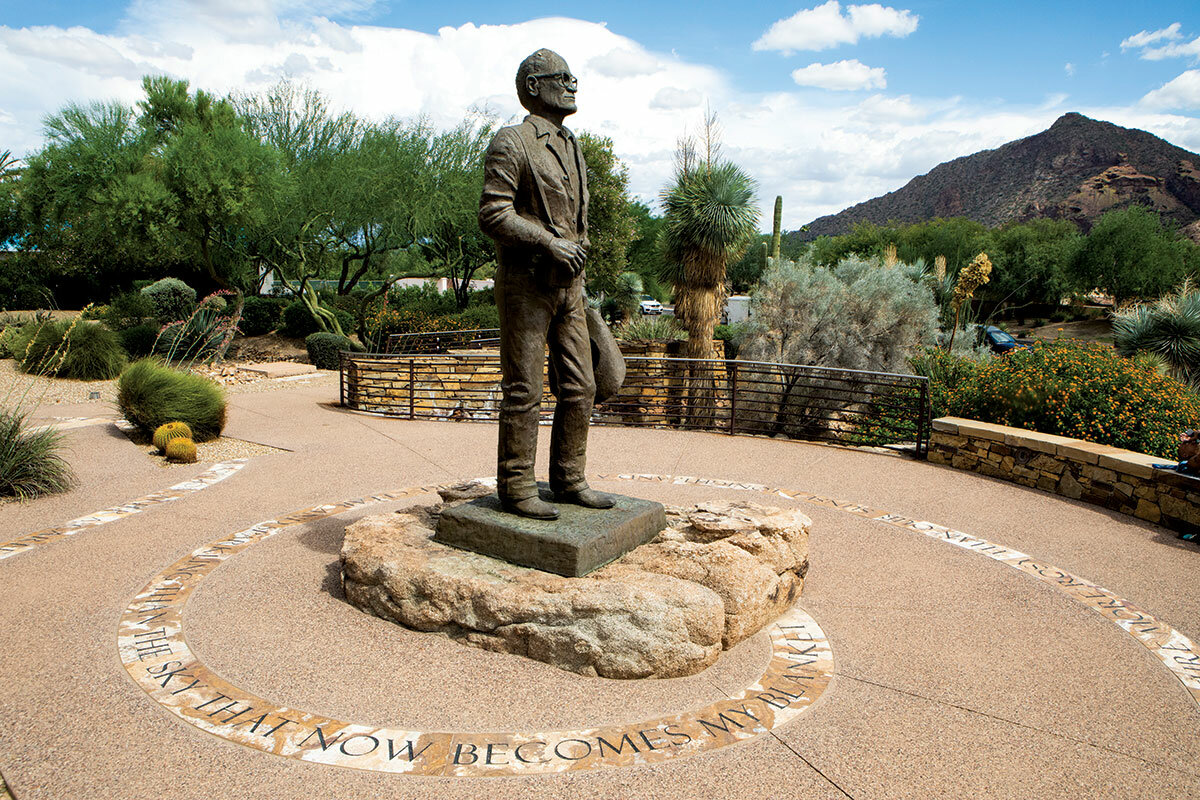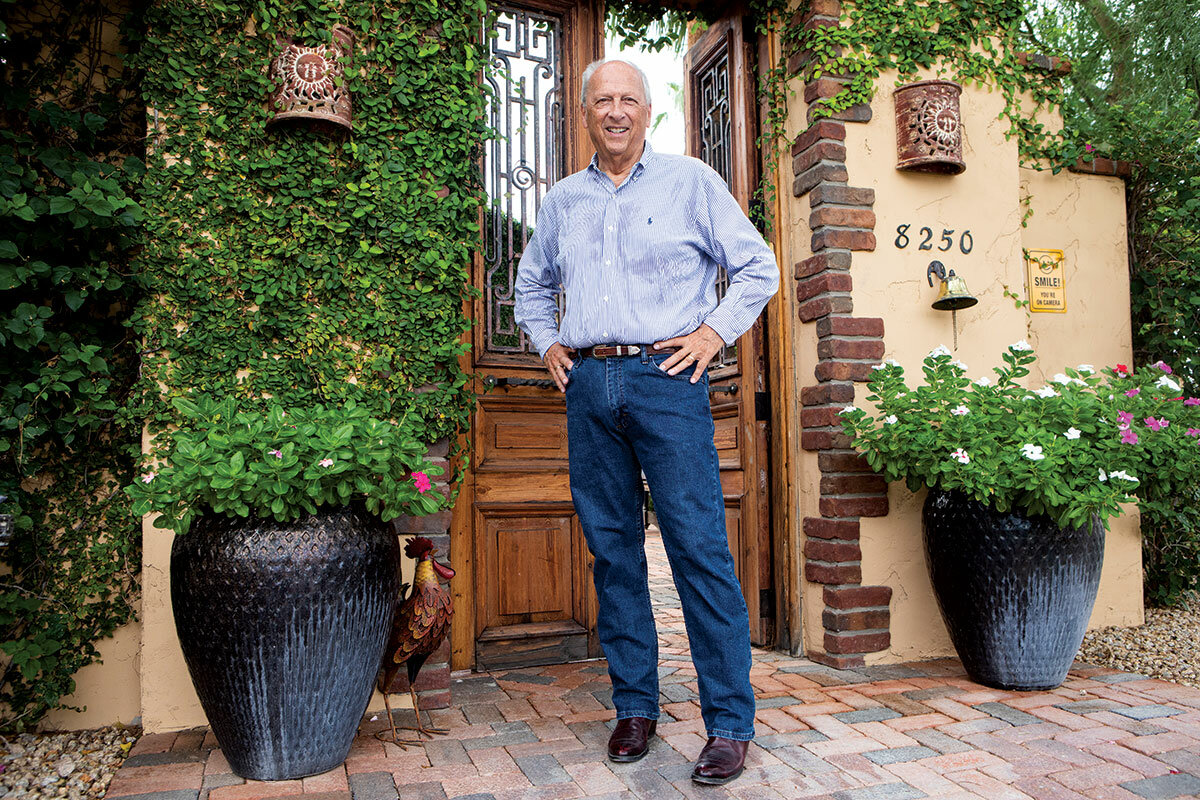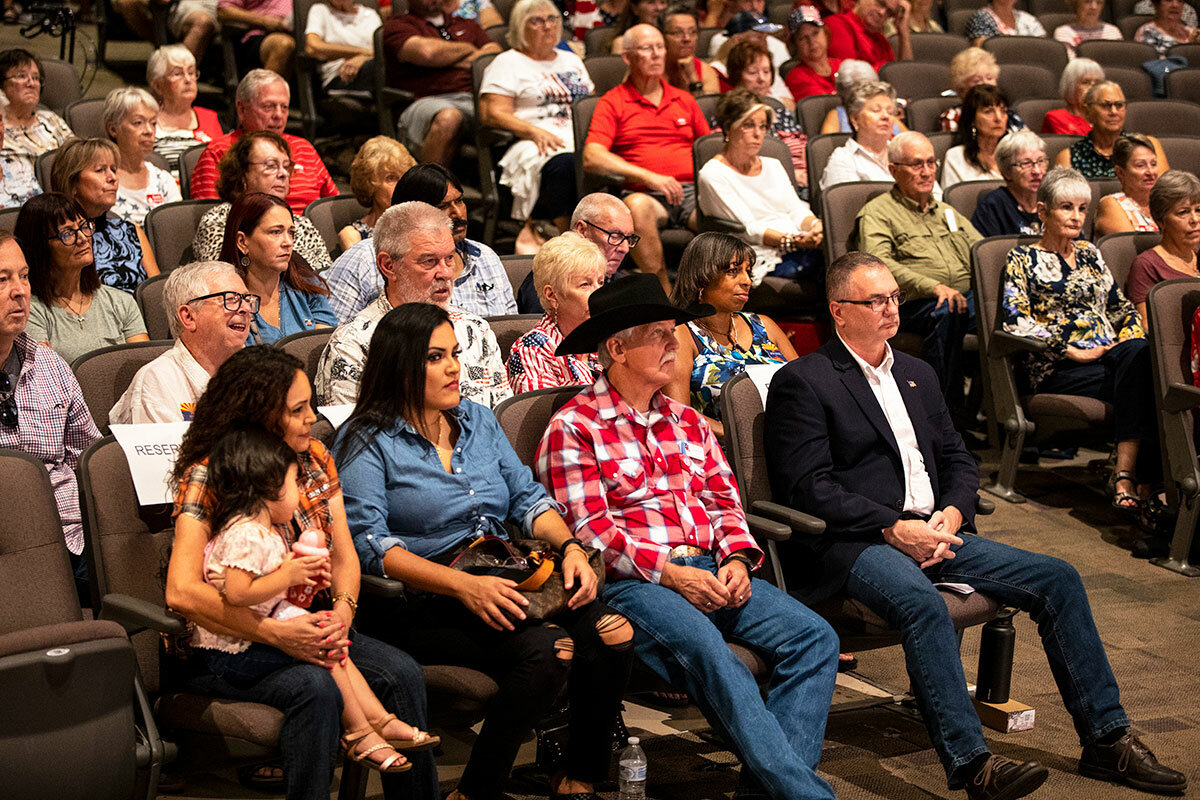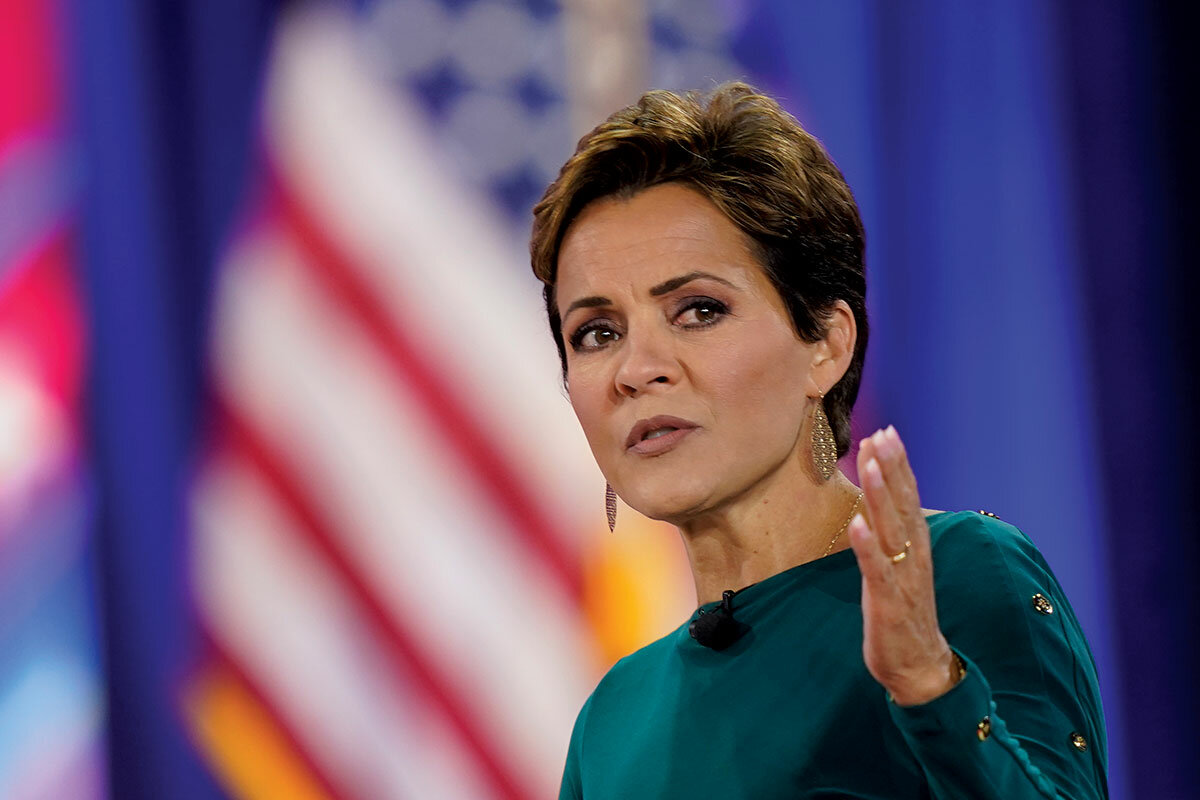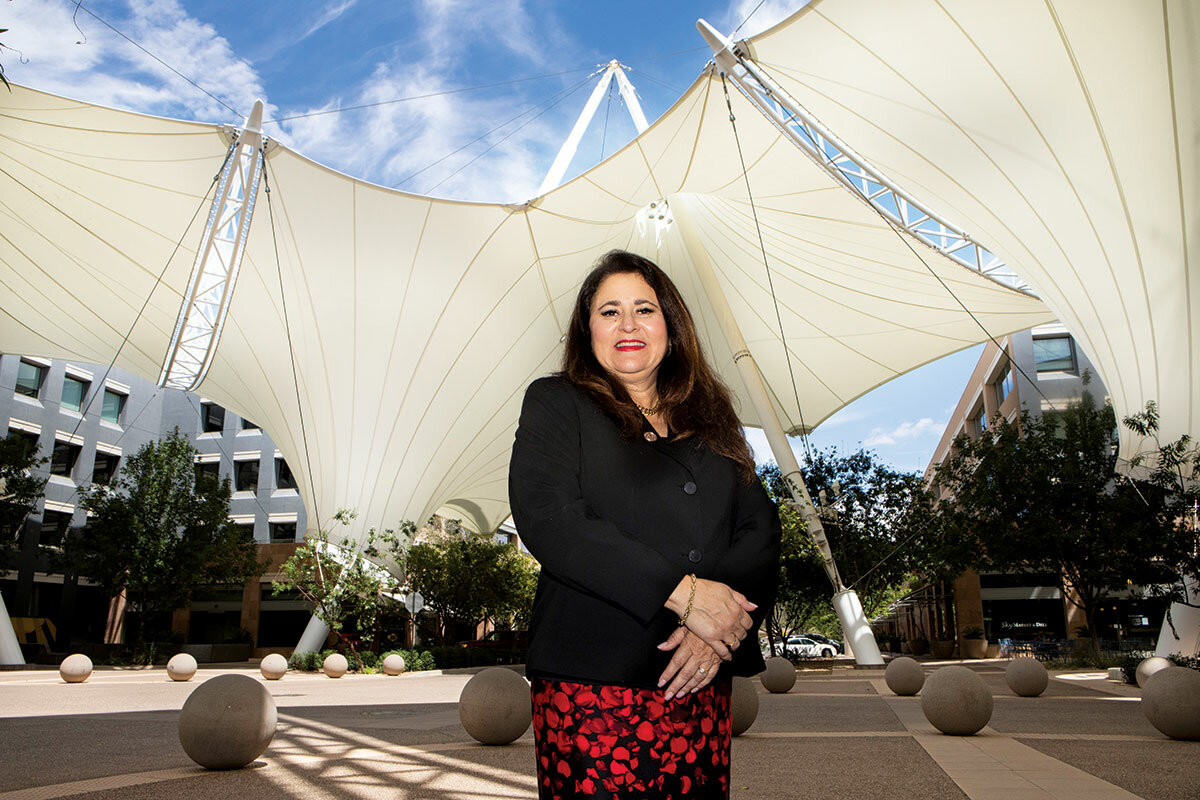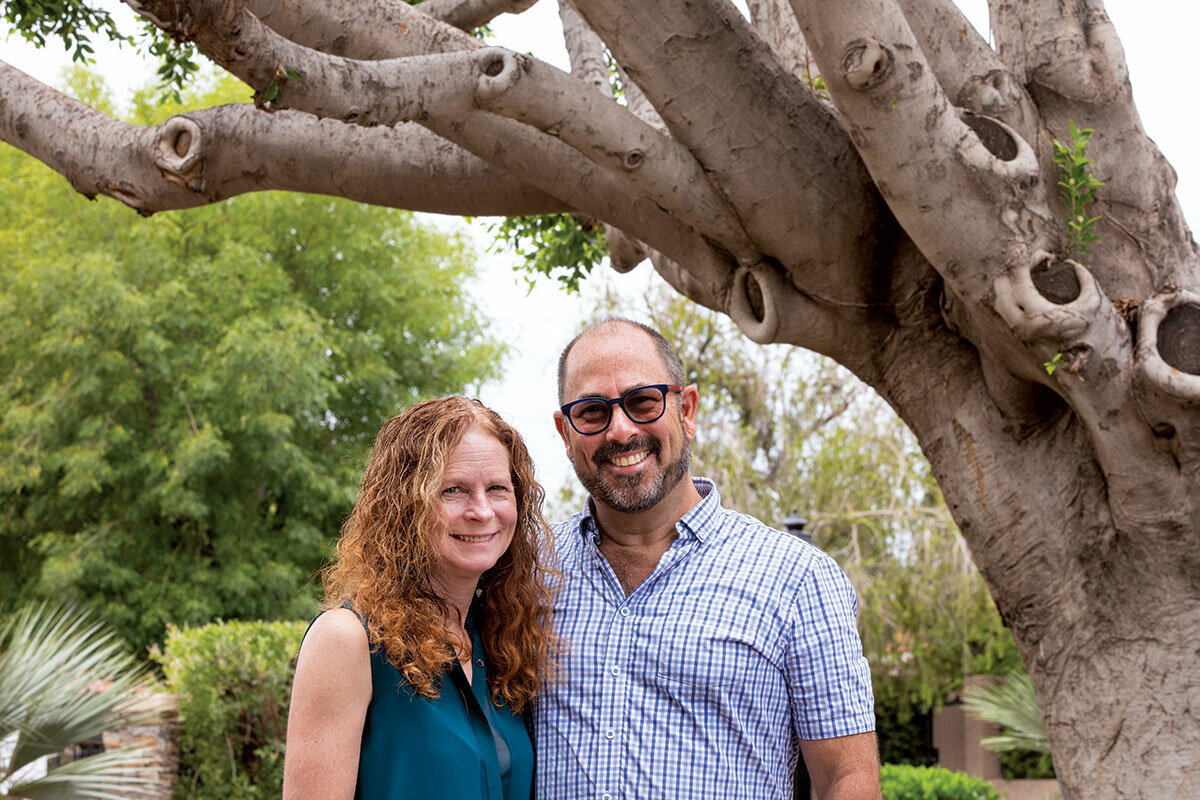Why the Republican Party’s future may be decided in Arizona
Loading...
| Scottsdale, Ariz.
Among the prickly pear and wispy paloverde trees of the Goldwater Memorial in Paradise Valley near Phoenix, one can’t help but wonder what its namesake would think if he focused his lens on Arizona’s Republican Party today.
Barry Goldwater was famously trounced as the GOP presidential nominee in the 1964 contest against President Lyndon B. Johnson. But his conservative ideals set the stage for another proponent of small government – Ronald Reagan. And the five-term senator put his state on a rightward path that would span decades, with mavericks like the late Sen. John McCain later taking up his mantle.
Why We Wrote This
A story focused onOnce a GOP stronghold, Arizona is now purple – and a battleground between traditional and MAGA Republicans. This conservative divide could shape the future of the Republican Party and the coming elections.
Yet in 2020, Arizona tipped narrowly to Joe Biden, and is now represented in the U.S. Senate by two Democrats.
After so many years of dominance, the GOP’s slippage here has led to furious finger-pointing. The Trump wing puts the blame squarely on “RINO” politicians, who they say have failed to uphold both conservative ideals and election security. The Republican establishment sees the Trump wing and its unsupported claims of voter fraud as dangerous.
November’s elections, which both parties are framing as a fight against tyranny, will also be a pivot point in what independent pollster Mike Noble describes as the “battle for the soul of the GOP.”
In a desert garden of prickly pear and wispy paloverde trees, a larger-than-life statue of Barry Goldwater gazes into a scorching Arizona sky. The Republican titan – deemed by many the father of modern conservatism – holds in one hand a cowboy hat, a nod to his roots in the American West and his commitment to self-reliance. The other hand rests on a camera case.
Senator Goldwater loved taking photographs. He captured more than 15,000 images of the Arizona desert and Native Americans, using his mother’s Brownie box camera when just a boy. His friend, the great landscape photographer Ansel Adams, called him “a fine and eager amateur” who compiled a pictorial record of “historical and interpretive significance.”
Visiting the Goldwater Memorial in Paradise Valley near Phoenix, one can’t help but wonder what the former presidential candidate would think if he focused his lens on Arizona’s Republican Party today.
Why We Wrote This
A story focused onOnce a GOP stronghold, Arizona is now purple – and a battleground between traditional and MAGA Republicans. This conservative divide could shape the future of the Republican Party and the coming elections.
He was famously trounced as the GOP presidential nominee in the 1964 contest against President Lyndon B. Johnson. But his conservative ideals set the stage for another proponent of small government – Ronald Reagan. And the five-term senator put his state on a rightward path that would span decades, with mavericks like the late Sen. John McCain taking up his mantle.
In recent years, however, the Grand Canyon State has turned from Sedona red to sunset purple, becoming a must-win swing state for both parties. It tipped narrowly to Joe Biden in 2020 and is now represented in the U.S. Senate by two Democrats.
That Republican erosion has ignited an existential “battle for the soul of the GOP,” says independent Arizona pollster Mike Noble.
In many ways it’s the same battle that’s been playing out across the nation ever since Donald Trump burst onto the political scene – but perhaps nowhere as intensely as in Arizona. After so many years of dominance, the GOP’s slippage here has led to furious finger-pointing, as well as a sense of disbelief. The Trump wing puts the blame squarely on “RINO” politicians, who they say have failed to uphold both conservative ideals and election security. The Republican establishment sees the Trump wing and its unsupported claims of voter fraud as dangerous and likely to be rejected by the state’s changing electorate – potentially putting the party on a path to marginalization.
So far, one side seems to have the upper hand. In August’s primaries, four Republican candidates endorsed by former President Trump – for governor, U.S. Senate, state attorney general, and secretary of state – all won handily, despite being significantly outspent by their rivals. All campaigned on a message that the 2020 election was fraudulent – a claim that was tested and refuted by hand counts, forensic tests, and an outside audit. Republican gubernatorial nominee Kari Lake, a charismatic former TV news anchor, has allied herself so closely with Mr. Trump in her campaign that some are now speculating if she wins in November – and polling shows her currently in a dead heat against Democrat Katie Hobbs – the former president could tap her as a potential running mate.
November’s elections, which both parties are framing as a fight against tyranny, will not only be a pivot point in the GOP identity struggle, but will also bear significantly on control of the U.S. Senate, and in 2024, the presidency.
“Arizona Republicans are at a crossroads, in a state where they’ve had unequivocal dominance to now being a battleground,” says Mr. Noble. While the Trump wing appears ascendant, he adds, the real test will come in November, when candidates face a broader swath of voters. “Winning the primary is great, but can you win the general election? Because if not, there is going to be a short life span for this movement.”
Revolution at the grassroots
To understand the forces shaping today’s GOP, new party activist Tommy Andrews recommends watching “2000 Mules” and “Selection Code.”
These films, claiming to show the 2020 election was fraudulent, have been criticized by experts for using misleading data points to draw false conclusions. But they’ve stoked enormous outrage on the right. And as Mr. Andrews points out, it’s not just conservatives who distrust the voting system – other recent films, such as “Kill Chain: The Cyber War on America’s Elections” and “Rigged: The Voter Suppression Playbook,” have highlighted vulnerabilities in America’s elections from more left-leaning perspectives.
“There is tremendous concern over election integrity,” says Mr. Andrews, a businessman who lives in Scottsdale. A well-to-do city of golf courses and spas bordering Phoenix, Scottsdale is part of vast, politically determinative Maricopa County – site of Arizona’s 2020 election recount and audit.
Mr. Andrews grew up in a Republican household and has always valued personal responsibility and small government. But he only recently became involved in politics, adding “precinct captain” to his list of activities outside work, along with cycling and swimming. He’s part of a nationwide grassroots strategy spearheaded by former Trump aide Steve Bannon and Arizona attorney Daniel Schultz to take control of the Republican Party from the bottom up, by filling hundreds of thousands of vacant party committee positions in voting precincts.
Volunteer precinct committee members are the building blocks of the party – they work to get out the vote, set rules, vote on policy positions, and send delegates to the presidential nominating convention.
Before the 2020 election, Mr. Andrews didn’t know what precinct he lived in, let alone what a precinct captain does. But after watching the election results come in with his wife, Kathy, he decided to find out. Both were immediately skeptical when Fox News called Arizona early for Mr. Biden: “We said, ‘That does not feel right.’”
When Mr. Andrews looked into the GOP precinct committee system, he discovered only two out of 15 committee slots in his Del Joya precinct were filled. He had lunch with the chair, got appointed and later elected, and set about finding “like-minded” people for the rest of the slots. As he explains from the cool and airy living room of his Spanish-style home, he vetted possible candidates by asking about their views on the 2020 election, border security, pandemic mandates, and their news sources.
“There is a faction of the Republican Party here that is very unhappy with the establishment,” says Mr. Andrews. He and his team have now filled all the remaining slots and have already changed the rules to do away with proxy voting on the precinct committee, which previously allowed just a few active committee members to hold sway.
Many issues motivate Mr. Andrews and his fellow conservatives (he uses that label deliberately): open borders, critical race theory in education, gender ideology, the administration’s handling of the economy. More recently, he’s been upset by the Aug. 8 FBI search of former President Trump’s Palm Beach, Florida, estate and President Biden’s Sept. 1 speech calling MAGA Republicans a threat to the republic.
But foremost among concerns is the matter of election integrity. While the GOP-backed audit in Arizona officially reaffirmed President Biden’s victory, it also found “significant issues,” explains the precinct captain.
Mr. Andrews served as an observer and then a worker for the audit conducted by Cyber Ninjas, hired by the Arizona Senate. The firm had no previous election auditing experience, and is no longer in business. Mr. Andrews says he personally saw half a dozen boxes of ballots where tally sheets did not match the contents. He extrapolates from his experience a 20% error rate, and more conservatively from the experience of other workers, a 5% mismatch rate. An error rate of 1% is acceptable under Arizona recount law.
Benny White, a Republican data analyst for the Arizona GOP for more than 10 years, was part of a team of experts who reviewed the Cyber Ninjas data and found its audit to be “meaningless” because it was so riddled with problems.
Mr. Andrews may have observed tally mismatches, says Mr. White, but generalizing from that is a mistake. Boxes of ballots are not “widgets coming down an assembly line.” Each is unique, he explains. “You have to look at the whole story, not just at one marble and decide that half the marbles are black.”
But Mr. Andrews is resolute. This November, he predicts, election integrity concerns and a backlash against President Biden will propel “a red wave like none you have seen before.”
Alienated Republicans
Mr. Andrews’ precinct activism is a “snapshot” of what’s happening more broadly in Arizona, according to Tyler Montague, a GOP consultant based in Mesa, which is also in Maricopa County. Since 2018, the MAGA wing of the party has been trying “to purge the party of ‘heretics,’” he says, an effort that’s intensified since the last presidential election.
Mesa is home to a lot of “traditional” Republicans, says Mr. Montague – including many members of The Church of Jesus Christ of Latter-day Saints, such as himself, who have historical roots there. Many of these Republicans are deeply troubled by the Trump wing’s policy positions on issues from trade to immigration – as well as what Mr. Montague describes as its anti-democratic tactics.
“They are ‘burn it all down’ people. Institution wreckers,” he says. Many “at the top” know their claims of a stolen election are a lie, he says, and yet they have convinced rank-and-file Republicans to believe it. “What’s more critical than our elections, free and fair elections that inspire confidence?”
Mr. Montague did his missionary work in Chile, and as a Boy Scout leader back in Arizona had several “Dreamers” – children whose families brought them to the United States illegally – in his troop. In 2011, he led a successful effort to recall state Senate leader Russell Pearce, the main sponsor of a controversial anti-illegal immigration law.
“People in my neighborhood like immigrants. They don’t like the white nationalist, anti-immigration people,” he says in a phone interview.
The grassroots battle within Arizona’s GOP has been going on for years. In 2016, Tyler Bowyer was the Republican chairman of Maricopa County, and a staunch Trump supporter. He moved to Mr. Montague’s neighborhood and Mr. Montague says he prevented Mr. Bowyer from becoming a precinct committeeman – and from being reelected county chair – by successfully recruiting others to fill the positions.
And yet Mr. Bowyer, also a Mormon, has continued to rise in the party. A leader in Turning Point USA, which organizes conservatives on college campuses, he’s a loyal ally of Ms. Lake and Arizona GOP Chair Kelli Ward, who has been subpoenaed by the Justice Department over a slate of “fake electors” whom Trump supporters planned to send to Congress on Jan. 6, 2021.
All this has made Mr. Montague feel alienated from his own party. And while he says he’s still in this for the long run, others like him have “become disenchanted.” It didn’t help when Ms. Lake, after winning her primary bid, crowed that “we drove a stake through the heart of the McCain machine.”
One friend, Yasser Sanchez, a fellow Mormon and immigration lawyer in Mesa, left the GOP to become an independent. Mr. Sanchez says he recently had lunch with a loyal Republican who won’t vote for Ms. Lake and isn’t sure what to do.
GOP consultant Sean Noble notes that 60,000 Arizona voters abstained from choosing a presidential candidate in 2020, while selecting candidates for other offices. “That’s a uniquely Trumpian problem.”
Mr. Sanchez, for his part, is not on the fence. “I wrote out a check to Katie Hobbs, and I called her and said, ‘Hey, let’s get working. I’m independent.’” He was hoping the GOP primary would produce a candidate he could vote for. Instead, they’ve “all kissed the ring of Trump and the big lie of the stolen election.” That, he says, is “dangerous.”
Kari Lake: Can she broaden her appeal?
A Kari Lake ad about border control shows some Barry Goldwater attitude. She strides toward the camera in her dusty cowboy boots and jeans, defiant and direct in her Arizona independence. But there’s far more of President Trump – she promises as governor to declare an invasion at the border, finish his wall, blow up drug cartel tunnels, and send in the National Guard to halt illegal immigration. The ad ends with his endorsement.
Ms. Lake herself is authoritative, convincing, and completely at ease speaking directly to the camera, which she did for two decades as a news anchor at the local Fox affiliate in Phoenix.
“She’s trying her best to meld themes that were present in the Arizona Republican Party with Goldwater, and again McCain and that maverick streak, with an adherence to the prime tenets of a Trumpist ideology,” says historian Brooks Simpson, at Arizona State University.
Her maverick streak resonates with Richard Truelick, one of Mr. Andrews’ new precinct committeemen who lives across the lake from him in a gated community of active retirees. He’s a genial man, formerly a VP with Beatrice Foods, who chats with neighbors when he walks his dogs, Lilly and Max. “The thing I like about her, she’s not a politician. She has no obligation to anyone on anything.”
Mr. Noble, the pollster, says Ms. Lake’s immediate task is to unify her party, which he describes as being in a state of “civil war.” His research shows stark differences between Trump supporters and “party” supporters, primarily over whether the election was stolen (82% of Trump supporters say it was, but only 50% of party supporters do). After that, she needs to reach for the independents – about a third of the electorate, he says. The last two elections underscore this necessity, he points out.
In 2016, Rep. Martha McSally moved right to win the GOP primary for the U.S. Senate – and stayed there for the general election. She lost to Democrat Kyrsten Sinema (Arizona’s first Democratic senator in three decades). In 2020, Ms. McSally again stuck firmly to then-President Trump, and lost her second Senate bid to Democrat Mark Kelly.
In recent polls, Senator Kelly is comfortably leading his Trump-endorsed opponent, Blake Masters, one of several GOP candidates to whom Senate leader Mitch McConnell may have been referring when he lamented that “candidate quality” may prevent Republicans from taking control of the Senate in November.
“That’s the problem with the base-only strategy,” concludes Mr. Noble.
Ms. Lake is one of four GOP swing-state gubernatorial candidates – the others are in Pennsylvania, Michigan, and Wisconsin – who say that Mr. Biden was not fairly elected. Had she been governor at the time, she has said, she would not have certified the 2020 election.
While this stance encourages some voters, it scares others – who perceive a militancy in her tone. In a statement after the FBI’s search of Mar-a-Lago, Ms. Lake described the government as “tyrants [who] will stop at nothing to silence the Patriots who are working hard to save America,” adding, “We will not accept it.” She later agreed on a podcast with Steven Crowder that Republicans should “disband the FBI.”
Arizona’s long slide from Goldwater
Arizona has always been a conservative state, says Professor Simpson, but Goldwater did not embrace deep-state conspiracy theories, and once considered doing a whistle-stop debate tour across America with President John F. Kennedy. He fought vigorously for conservative values on the economy and foreign policy – but was not nearly as interested in culture war issues such as abortion. The senator was one of three GOP members of Congress who went to the White House to tell Richard Nixon he did not have the votes to survive impeachment. President Nixon resigned the next day.
Today’s Arizona Republican Party is far different from that of Goldwater. Demographically, it’s got fewer college-educated white people and more Hispanics and working-class voters. Matt Salmon, a former Arizona congressman who pulled out of the GOP race for governor, told the Monitor that when he was first elected in 1994, “it was all about ideas” – with Republicans running on the Contract With America. “Now it’s personality-driven.”
The state GOP has been “drifting rightward in more militant ways” since the 1990s, observes Professor Simpson. “This isn’t something that Donald Trump created. The party’s been sliding in this direction for quite some time.” He cites the nearly 25-year tenure of Maricopa County Sheriff Joe Arpaio as an example.
The state’s establishment Republican leadership has called for party unity, with former Gov. Jan Brewer invoking Goldwater’s concession speech, according to an attendee at a GOP victory rally in Surprise, another Phoenix suburb. Just after the primary, the former governor told The New York Times that Ms. Lake had gone “so far to the right that I don’t know if she can recover,” and said she hoped she would tell voters the truth about the 2020 election.
But Latino voters could help Ms. Lake. Mr. Trump made inroads with Hispanics in 2020, and economic conditions could drive them to the polls this time around, says Republican Lea Márquez Peterson, the chairwoman of the Arizona Corporation Commission – and the first Latina elected to a statewide position.
Many Hispanics in Arizona are small-business owners and workers, she explains, and their desire for lower taxes, less regulation, and small government aligns with the Republican Party. Latino businesses acutely feel the effects of inflation and are still reeling from the pandemic and supply chain disruptions, says Ms. Márquez Peterson, who used to head up the Tucson Hispanic Chamber of Commerce and ran a chain of gas stations and convenience stores.
But both parties have some work to do. “I haven’t heard a lot of excitement yet,” she says, lamenting the “divisiveness” of the primary. While she did not support Ms. Lake in the primary, she is urging Latinos to vote the GOP ticket. “I do not want to see key races lost to Democrats.”
It’s important to remember that every election is a choice, says Mr. Noble, the pollster – a dynamic that could work to Ms. Lake’s advantage. He says Democrats made “a very big mistake” by nominating Ms. Hobbs, who has declined to debate Ms. Lake and who comes across as “meek and weak.” “From a personality or charisma perspective, those two candidates couldn’t be more different,” he says.
For Democrats, a fight for democracy
Here’s what Ms. Hobbs says Arizona voters are worried about: reproductive freedom, public education, the dwindling Colorado River and ensuing water crisis, and of course, the price of everything – from groceries to housing. But, she says, there’s also an overarching concern: democracy.
As Arizona’s secretary of state, Ms. Hobbs was in the thick of the 2020 dispute. She has maintained consistently that the election was fair. The sample hand recount in Maricopa County, for example, found a 100% match with the machine ballot count.
Arizonans are tired of endlessly litigating the 2020 election and want leaders who will tackle real issues, says Ms. Hobbs, in an interview at a Phoenix cafe. “This race is not about Democrats or Republicans; it’s about sanity versus chaos.” She characterizes the November election as a choice between who will move the state forward and who will “drag us backwards to the Civil War.”
(The Monitor’s request to interview Ms. Lake was turned down. Questions sent to the campaign office, at her spokesperson’s direction, went unanswered.)
Ms. Hobbs warns about a better-coordinated Republican effort to overturn elections this year and in 2024. The Trump-endorsed candidate vying for her current job, Mark Finchem, says the 2020 election was stolen and has called for Ms. Hobbs’ arrest.
All of this is of grave concern to Daniel Martineau and his wife, Laura Medved, neighbors to Mr. Truelick, one of the new GOP precinct committeemen in Scottsdale. Mr. Martineau plays golf with the Truelicks and they are all friendly, even if their political views differ. The couple, who both work in real estate and will soon be new grandparents, are registered Democrats but consider themselves centrists and have voted on both sides of the aisle. Two years ago, they put out the lone Biden sign in their gated neighborhood.
“I worry about all future elections,” says Ms. Medved, at their kitchen table. Her husband warns of “fascism” in a GOP that no longer allows dissenting views. But Mr. Martineau is also worried about Ms. Hobbs’ ability to pull out a victory. He laments that she lacks the charisma and positive message of a candidate like Barack Obama. He notices his Democratic friends tuning out politics – though his wife says the Supreme Court ruling on abortion could help turn out the vote.
For his part, Mr. Truelick sees Goldwater conservatism in Mr. Trump’s “America First” approach. He quotes from Goldwater’s nomination acceptance speech: “Extremism in defense of liberty is no vice.” Still, he also wonders if today’s GOP in Arizona will be able to hang together.
“There’s a lot of energy in our party here. I hope it doesn’t come apart.”






